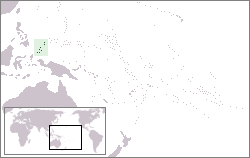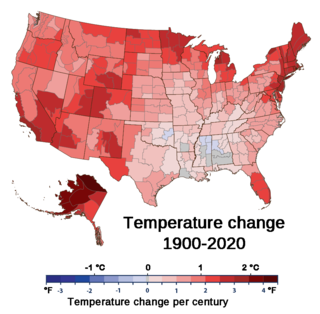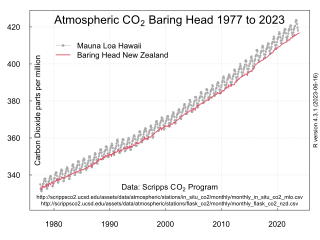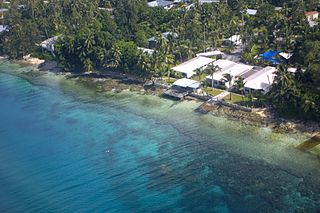
The environment of Palau consists of a number of islands in the western Pacific Ocean.

The environment of Palau consists of a number of islands in the western Pacific Ocean.
The avifauna of Palau includes a total of 149 species, of which 10 are endemic, three have been introduced by humans, and 17 are rare or accidental. Three species are globally threatened.
The Palau government are concerned about the effects of climate change on the island nation. In 2008 Palau requested that the UN Security Council consider protection against rising sea levels due to climate change. [1]
Tommy Remengesau, the president of Palau, has said: [2]
Palau has lost at least one third of its coral reefs due to climate change related weather patterns. We also lost most of our agricultural production due to drought and extreme high tides. These are not theoretical, scientific losses -- they are the losses of our resources and our livelihoods.... For island states, time is not running out. It has run out. And our path may very well be the window to your own future and the future of our planet.
Palau consists of eight principal islands and more than 250 smaller ones lying roughly 500 miles southeast of the Philippines. The islands of Palau constitute part of the Caroline Islands chain.

Deforestation or forest clearance is the removal and destruction of a forest or stand of trees from land that is then converted to non-forest use. Deforestation can involve conversion of forest land to farms, ranches, or urban use. About 31% of Earth's land surface is covered by forests at present. This is one-third less than the forest cover before the expansion of agriculture, with half of that loss occurring in the last century. Between 15 million to 18 million hectares of forest, an area the size of Bangladesh, are destroyed every year. On average 2,400 trees are cut down each minute. Estimates vary widely as to the extent of deforestation in the tropics. In 2019, nearly a third of the overall tree cover loss, or 3.8 million hectares, occurred within humid tropical primary forests. These are areas of mature rainforest that are especially important for biodiversity and carbon storage.

Kiribati, officially the Republic of Kiribati, is an island country in the Micronesia subregion of Oceania in the central Pacific Ocean. Its permanent population is over 119,000 as of the 2020 census, with more than half living on Tarawa atoll. The state comprises 32 atolls and one remote raised coral island, Banaba. Its total land area is 811 km2 (313 sq mi) dispersed over 3,441,810 km2 (1,328,890 sq mi) of ocean.

Palau, officially the Republic of Palau, is an island country in the Micronesia subregion of Oceania in the western Pacific Ocean. The republic consists of approximately 340 islands and connects the western chain of the Caroline Islands with parts of the Federated States of Micronesia.

The United Nations Trusteeship Council is one of the six principal organs of the United Nations, established to help ensure that trust territories were administered in the best interests of their inhabitants and of international peace and security.

The International Union for Conservation of Nature (IUCN) is an international organization working in the field of nature conservation and sustainable use of natural resources. Founded in 1948, IUCN has become the global authority on the status of the natural world and the measures needed to safeguard it. It is involved in data gathering and analysis, research, field projects, advocacy, and education. IUCN's mission is to "influence, encourage and assist societies throughout the world to conserve nature and to ensure that any use of natural resources is equitable and ecologically sustainable".

The Philippine Sea is a marginal sea of the Western Pacific Ocean east of the Philippine Archipelago and the largest sea in the world, occupying an estimated surface area of 5 million square kilometers. The Philippine Sea Plate forms the floor of the sea. Its western border is the first island chain to the west, comprising the Ryukyu Islands in the northwest and Taiwan in the west. Its southwestern border comprises the Philippine islands of Luzon, Catanduanes, Samar, Leyte, and Mindanao. Its northern border comprises the Japanese islands of Honshu, Shikoku and Kyūshū. Its eastern border is the second island chain to the east, comprising the Bonin Islands and Iwo Jima in the northeast, the Mariana Islands in the due east, and Halmahera, Palau, Yap and Ulithi in the southeast. Its southern border is Indonesia's Morotai Island.

The Pacific Islands Forum (PIF) is an inter-governmental organisation that aims to enhance cooperation among countries and territories of Oceania, including formation of a trade bloc and regional peacekeeping operations. It was founded in 1971 as the South Pacific Forum (SPF), and changed its name in 1999 to "Pacific Islands Forum", so as to be more inclusive of the Forum's Oceania-spanning membership of both north and south Pacific island countries, including Australia.

Anote Tong is an I-Kiribati environmental activist and former politician for the Pillars of Truth party with half Chinese heritage, who served as the fourth president of Kiribati, from 2003 to 2016. He won the election in July 2003 with a slim plurality of votes cast (47.4%) against his older brother, Harry Tong (43.5%) and the private lawyer Banuera Berina (9.1%). The elections were contested by the opposition, due to allegations of electoral fraud but the High Court of Tarawa had confirmed that there was no fraud. He was re-elected on 17 October 2007 for a second term (64%). In 2012, Tong was reelected for a third term, although with a significantly smaller percentage than in the previous two elections.

The Elders is an international non-governmental organisation of public figures noted as senior statesmen, peace activists and human rights advocates, who were brought together by Nelson Mandela in 2007. They describe themselves as "independent global leaders working together for peace, justice, human rights and a sustainable planet". The goal Mandela set for The Elders was to use their "almost 1,000 years of collective experience" to work on solutions for seemingly insurmountable problems such as climate change, HIV/AIDS, and poverty, as well as to "use their political independence to help resolve some of the world's most intractable conflicts".

Climate change has led to the United States warming by 2.6 °F since 1970. The climate of the United States is shifting in ways that are widespread and varied between regions. From 2010 to 2019, the United States experienced its hottest decade on record. Extreme weather events, invasive species, floods and droughts are increasing. Climate change's impacts on tropical cyclones and sea level rise also affect regions of the country.

Climate change in New Zealand involves historical, current and future changes in the climate of New Zealand; and New Zealand's contribution and response to global climate change. Summers are becoming longer and hotter, and some glaciers have melted completely and others have shrunk. In 2021, the Ministry for the Environment estimated that New Zealand's gross emissions were 0.17% of the world's total gross greenhouse gas emissions. However, on a per capita basis, New Zealand is a significant emitter, the sixth highest within the Annex I countries, whereas on absolute gross emissions New Zealand is ranked as the 24th highest emitter.
Environmental governance (EG) consists of a system of laws, norms, rules, policies and practices that dictate how the board members of an environment related regulatory body should manage and oversee the affairs of any environment related regulatory body which is responsible for ensuring sustainability (sustainable development) and manage all human activities—political, social and economic. Environmental governance includes government, business and civil society, and emphasizes whole system management. To capture this diverse range of elements, environmental governance often employs alternative systems of governance, for example watershed-based management.
The 45th Pacific Islands Forum was held from 29 July to 1 August 2014 in Palau. The forum's official opening was held in the capital Ngerulmud, in Melekeok State, but the majority of events were held in Koror, Palau's largest city and former capital. The official theme of the meeting was "The Ocean: Life & Future". Topics under discussion include climate change, commercial fishing, non-communicable diseases and the possibility of readmitting Fiji to the forum.

The effects of climate change on small island countries are affecting people in coastal areas through sea level rise, increasing heavy rain events, tropical cyclones and storm surges. These effects of climate change threaten the existence of many island countries, their peoples and cultures. They also alter ecosystems and natural environments in those countries. Small island developing states (SIDS) are a heterogenous group of countries but many of them are particularly at risk to climate change. Those countries have been quite vocal in calling attention to the challenges they face from climate change. For example, the Maldives and nations of the Caribbean and Pacific Islands are already experiencing considerable impacts of climate change. It is critical for them to implement climate change adaptation measures fast.

Climate change litigation, also known as climate litigation, is an emerging body of environmental law using legal practice to set case law precedent to further climate change mitigation efforts from public institutions, such as governments and companies. In the face of slow climate change politics delaying climate change mitigation, activists and lawyers have increased efforts to use national and international judiciary systems to advance the effort. Climate litigation typically engages in one of five types of legal claims: Constitutional law, administrative law, private law (challenging corporations or other organizations for negligence, nuisance, etc., fraud or consumer protection, or human rights. Litigants pursuing such cases have had mixed results.

Climate change is affecting Austrian temperatures, weather, ecosystems and biodiversity. Since 1950 temperatures have risen by 1.8 °C, and in the past 150 years glaciers have melted, losing a significant amount of their volume. Changed precipitation patterns, increased temperatures, reduced snowfall, melting glaciers and more frequent extreme weather phenomenon, such as droughts, are expected effects from climate change. Ecosystems and biodiversity in Austria are facing changes due to increasing temperatures and the spread of thermophile species, heat and drought stress on animals and plants, an increase in alien and invasive species and an increase in pathogenic organisms and the spread of disease.

Climate change is a major issue for the Maldives. As an archipelago of low-lying islands and atolls in the Indian Ocean, the existence of the Maldives is severely threatened by sea level rise. By 2050, 80% of the country could become uninhabitable due to global warming. According to the World Bank, with "future sea levels projected to increase in the range of 10 to 100 centimeters by the year 2100, the entire country could be submerged". The Maldives is striving to adapt to climate change, and Maldivian authorities have been prominent in international political advocacy to implement climate change mitigation.

Due to its geographical and natural diversity, Indonesia is one of the countries most susceptible to the impacts of climate change. This is supported by the fact that Jakarta has been listed as the world's most vulnerable city, regarding climate change. It is also a major contributor as of the countries that has contributed most to greenhouse gas emissions due to its high rate of deforestation and reliance on coal power.

Climate change in the Marshall Islands is a major issue for the country. As with many countries made up of low-lying islands, the Marshall Islands is highly vulnerable to sea level rise and other impacts of climate change. The atoll and capital city of Majuro are particularly vulnerable, and the issue poses significant implications for the country's population. These threats have prompted Marshallese political leaders to make climate change a key diplomatic issue, who have responded with initiatives such as the Majuro Declaration.
Climate change in Fiji is an exceptionally pressing issue for the country - as an island nation, Fiji is particularly vulnerable to rising sea levels, coastal erosion and extreme weather. These changes, along with temperature rise, will displace Fijian communities and will prove disruptive to the national economy - tourism, agriculture and fisheries, the largest contributors to the nation's GDP, will be severely impacted by climate change causing increases in poverty and food insecurity. As a party to both the Kyoto Protocol and the Paris Climate Agreement, Fiji hopes to achieve net-zero emissions by 2050 which, along with national policies, will help to mitigate the impacts of climate change.